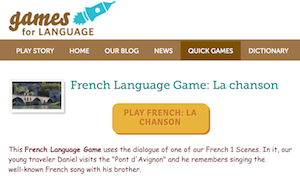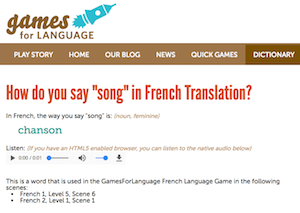How to say 'song' in French? Try this Language Game!
 We are always surprised that “How to say 'song' in French?” gets so many hits on our Gamesforlanguage Dictionary! And those hits are in spite of the increased use and popularity of Google Translate, which provides the translation as well.
We are always surprised that “How to say 'song' in French?” gets so many hits on our Gamesforlanguage Dictionary! And those hits are in spite of the increased use and popularity of Google Translate, which provides the translation as well.
So we thought we would give those who are looking for the translation of 'song' a Quick French Language Game: La Chanson. Click on the link or the image above to play it. You'll learn also a bit about the Saint Bénézet bridge - which you may know under another name.
And for those who like to practice French with songs and want to learn more about the etymology of “song” and “chanson,” here are a few fun facts.
Singing the Song
It appears that the English “to sing” has its roots in the Proto-Germanic word “sengwan,” and the later old High German and Old English word “singan.” Variations in other Germanic languages over the centuries have led to today's German “singen,” Dutch “zingen,” Swedish “sjunga,” and Norwegian and Danish “synge.”
The Online Etymology Dictionary notes that there are “no related forms in other languages.”
Chanter la Chanson, Cantare la Canzone, Cantar la Canción, Cantar a Canção
 The roots of the French "chanson" go back to Latin. This is also true for other Romance languages: “canzone” (Italian), “canción” (Spanish), “canção” (Portuguese).
The roots of the French "chanson" go back to Latin. This is also true for other Romance languages: “canzone” (Italian), “canción” (Spanish), “canção” (Portuguese).
The Old French “chançon” derives from the Latin “cantionem” (song) and from the Latin verbs “cantare” and “canere.” The French, Italian, Spanish, and Portuguese verbs for “to sing” are all identical or close to their Latin root.
Song vs. Chanson
The words “song” and “chanson” clearly have different roots. This may not be surprising. Still, a recent article pointed out that “The English language is a lot more French than we thought,...”. What is interesting from the article's analysis and chart is the conclusion that of the first 200 most-used English words, Old Norse makes up 5-10% and Anglo-Saxon 85-90%.
Can that be the reason that the French or Latin terms never replaced the Old English?
Our Two Favorite “Songs” in French
Our readers will know that we also like songs as a way to practice languages. We are especially fond of two French songs: Edith Piaf's: “Non, je ne regrette rien” and Joe Dassin's: “Si tu n'existais pas”.
The ear-worm quality of these songs lets you easily memorize key phrases and expressions. And when you hear them several times, you'll discover new words and grammar forms that stay with you.
But these are just two songs we like. You should find a few of your own. Listen to them, memorize and sing them, and your “chanson” (or canzone, canción, canção, etc.) will not remain just a bunch of foreign words to you!
Bio: Ulrike & Peter Rettig are co-founders of Gamesforlanguage.com. They are lifelong language learners, growing up in several European countries before moving to Canada and the United States. You can follow them on Facebook, Twitter, and Instagram.
